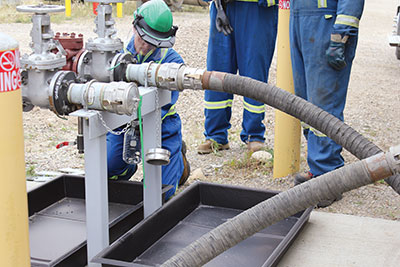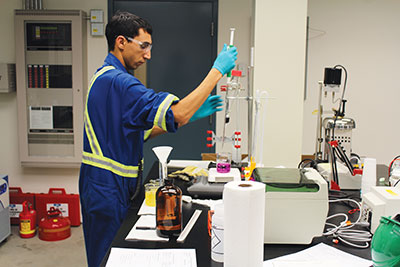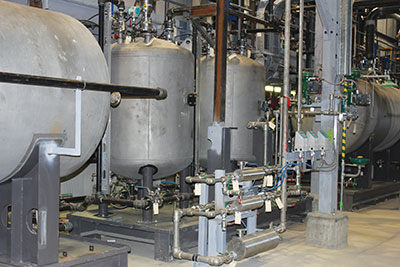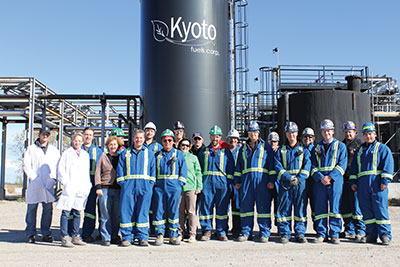
Up and running
December 16, 2013
By
Andrew Macklin
Kelsey Prenevost and his team at Kyoto Fuels will never forget the sig-nificance of September 28, 2013. With four years of construction behind it, Kyoto Fuels was finally producing biodiesel.
Kelsey Prenevost and his team at Kyoto Fuels will never forget the sig-nificance of September 28, 2013. With four years of construction behind it, Kyoto Fuels was finally producing biodiesel.
 |
|
| Kyoto Fuels staff continuously tested the equipment throughout the construction process.
|
The success that followed that day, the first of three days that would ultimately produce a combined 260,000 litres of commercial-grade biodiesel, has given Kyoto Fuels plenty of reasons to be optimistic about the company’s future in the biofuels industry.
Starting from scratch
When Kyoto Fuels president and CEO Kelsey Prenevost began investigating the viability of a biofuels business in Alberta, he looked for partners that could complement his strong knowledge of the biotechnology sector through his work with Agriculture and Agri-food Canada and the Canadian Food Inspection Agency.
 |
|
| A sample of biodiesel is collected during the commissioning phase in order to test the quality of the fuel.
|
Enter Jeff Arsenych and John Koliasha, whose experience with the petroleum fuels and transportation industries respectively, provided the vital expertise to help push a biofuel project forward. A fourth member was added to the management team in the early stages, Robin Tams, who possessed a strong knowledge of both the financial and sales markets.
With a management team in place, the decision had to be made about which part of the biofuel sector Kyoto Fuels would attempt to infiltrate. According to Prenevost, that decision was easily made.
“We recognized that biodiesel had the highest return on environment that was available, not just return on investment,” explains Prenevost. “For the amount of energy that we put into making a litre of biodiesel fuel, we get the best return energy-wise.”
Next came the decision of where in Alberta to put the plant. As members of the team began to investigate what types of feedstock they wanted to use in the production process, the location of the plant became clear.
“Our original plan was to only use animal fat in our biodiesel production,” says Prenevost. “Lethbridge, and our site, is almost equidistant between the two biggest animal processing facilities in Canada: one in Brooks and one in High River.”
The proximity to two plants would allow Kyoto Fuels to play on both, which it was assumed must happen to obtain the best price for feedstock for the plant. The proximity to the Canada-U.S. border also was a factor since the company understood that the American biodiesel market could have a potentially significant role in its operation.
 |
|
| In the lab, a researcher tests the quality of the biodiesel produced at Kyoto Fuels’ plant in Lethbridge, Alta.
|
The next hurdle to overcome was funding. Through a campaign to get local investors on board, Kyoto Fuels was able to raise close to $20 million, approximately half of the overall project cost, and enough to get the preliminary stages of the plant off the ground. The government of Alberta also came through with $10 million in grants, and the remaining money was obtained through major lenders.
Construction of the plant involved a partnership with Seattle-based Primus Biovision, which helped Kyoto Fuels design and assemble the plant using Kyoto’s biodiesel technology. The company hired Integrated Industrial Solutions (IIS) of Forest, Ont., to operate the plant and manage Kyoto’s 30 employees contracted through IIS.
Focus on production
With all elements of the operation in place and construction of the Lethbridge plant completed, Kyoto Fuels is finally able to focus on the core of its business: producing high-quality biodiesel.
 |
|
| Seattle-based Primus Biovision assembled the biodiesel plant for Kyoto Fuels, and was also involved in helping Kyoto Fuels design the facility.
|
Based on the early results from Kyoto Fuels’ early testing, the company expected the commissioning of the plant, which began with the late September start of production, to last only six weeks. Surprisingly, even the early batches produced were at a high enough quality to be sold commercially.
Part of the reason for such a short commissioning phase for Kyoto Fuels is that many of the improvements to the process were integrated during the construction phase. That created some delays in the original construction, but building in those improvements during the original construction is now seen as beneficial to the commissioning process. As a result, the company believes that it will be at full production by the end of 2013.
The biodiesel being produced at the plant is meeting the ASTM+ standard for biodiesel, higher than the ASTM standard expected in much of the North American market. According the Prenevost, “that is the buyer expectation in Canada, ASTM+, not ASTM like in the U.S. We have demonstrated that we can meet that standard during test runs. Also, producing ASTM+ allows access to all North American markets.”
Currently, Kyoto Fuels is meeting that standard by using vegetable oils for feedstock. The Kyoto Fuels plant was built to be able to process multiple feedstocks, including vegetable oils and animal fats. The decision was made to start by using vegetable oils, mainly canola oils, for several factors, including the abundance of canola oil sources available.
“We have been buying canola oil from various suppliers,” says Prenevost. “There is lots of availability this year thanks to a bumper crop.”
The plan is that the company will eventually switch from using vegetable oils to using animal fats once its technology for producing biodiesel has been fully demonstrated at 100 per cent capacity. But the company is not likely to switch entirely to using animal fats, since some customers prefer biodiesel produced from vegetable oils. Because tallows have a higher freeze point, that option is not available for some of Kyoto Fuels’ market. Also, the company has identified that some markets it hopes to penetrate want only canola-based biodiesel.
 |
|
| Kyoto Fuels employs a staff of 30, which is contracted through Integrated Industrial Solutions.
|
That market is primarily Canada, where the majority of the company’s business is focused. Prenevost believes that Canada’s biodiesel market is underserviced, a major reason the company is focusing on the domestic market. Its proximity to Canada’s big oil producers also plays a major role in that decision, as the low cost of transportation from Lethbridge has the potential to make up for cost differences from competitive biodiesel suppliers.
There is a demonstrated demand for biodiesel in Alberta, with the province in need of 120 million litres a year in order to meet the on-road use requirements that resulted from Canada’s two per cent renewable fuel mandate. Nationally, the demand is five times that amount at 600 million litres according to Prenevost, opening the door for further penetration in domestic markets.
Because of the recognized need for more biodiesel production here in Canada, Kyoto Fuels is already in the process of planning for a second biodiesel production plant. The company has purchased a piece of land for the second facility, at an undisclosed location, but construction timelines will depend on the success of its production at the Lethbridge plant. The ideal timelime would be to have the second plant built within the next two years, but nothing has been set in motion just yet.
Kyoto Fuels is also eyeing global expansion. The company has the opportunity to work with a company in South America to construct biodiesel plants in countries and regions that would highly benefit from the environmental impact of biodiesel as a renewable fuel source.
Pillars of success
According to Prenevost, the environmental impact of biodiesel production has been a driving force for pushing the business forward. Based on his research, he estimates that the reduction in greenhouse gas emissions as a result of Kyoto Fuels’ biodiesel production will be equivalent to the removal of 35,000 cars from the road.
The environmental impact of the Kyoto Fuels operation is one of the pillars of its motto, along with the quality of the company’s product, and the health and safety of its production. In the four years since construction began, Kyoto Fuels has yet to have any time lost due to workplace safety issues.
Combined with its ability to make ASTM+ quality biodiesel, it appears Kyoto Fuels’ model for a successful biodiesel operation is working. •
Print this page